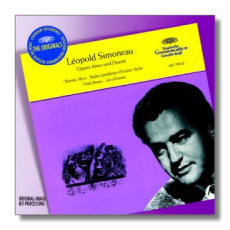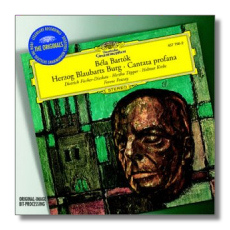
The Internet's Premier Classical Music Source
Related Links
- Latest Reviews
- More Reviews
-
By Composer
-
Collections
DVD & Blu-ray
Books
Concert Reviews
Articles/Interviews
Software
Audio
Search Amazon
Recommended Links
Site News
 CD Review
CD Review
Deutsche Grammophon Originals

French & Italian Arias And Duets
- Duets from:
- Il matrimonio segreto
- La Bohème
- Faust
- Manon
- Arias from:
- L'Arlesiana
- Tosca
- La Juive
- Les Pêcheurs de perles
- Joseph en Egypte
- Mignon
- Manon
- L'elisir d'amore
- La traviata
Léopold Simoneau, tenor
Pierrette Alarie, soprano
Radio Symphony Orchestra Berlin/Lee Schaenen
Radio Symphony Orchestra Berlin/Paul Strauss
Deutsche Grammophon 457752-2 ADD mono/stereo 76:53


Béla Bartók
- Bluebeard's Castle
- Cantata profana
Hertha Töpper (Judith)
Dietrich Fischer-Dieskau (Bluebeard, baritone soloist in Cantata profana)
Helmut Krebs, tenor
RIAS Chamber Choir
Choir of St. Hedwig's Cathedral
Berlin Radio Symphony Orchestra/Ferenc Fricsay
Deutsche Grammophon 457756-2 ADD mono/stereo 72:59
It is a slightly melancholy experience to hear the Simoneau disc, a new entry in Deutsche Grammophon's "The Originals" series, and to realize how infrequently artistry like his comes along. Who sings like this today? I would give away ten recitals by almost any of today's tenor "stars" for another CD as satisfying as this one.
Simoneau, a French-Canadian singer, was born in 1916, and he excelled in French opera, Mozart, and in oratorio. The last eight selections on this disc (all arias, with conductor Strauss) were first released in 1957; the first seven (four duets with soprano Pierrette Alarie and three arias, all with conductor Schaenen) were released three years later. Collectors have prized these records, and now a new generation of vinyl-deficient music-lovers can hear why.
Simoneau's voice is light and graceful, but he sings with an intensity – albeit tastefully – that makes him anything but a lightweight. He's a lyric tenor who would have been out of place as Manrico or Radames, but his Des Grieux and Faust are filled with controlled ardency. His high notes, when soft, both caress and excite the ear. He doesn't tear Rodolfo's and Cavaradossi's passion to shreds; he's too much of a classicist for that. However, you will seldom, if ever, hear the love duets sung as intimately and as meaningfully as they are sung here. Faust and Marguerite are not singing to the footlights – they are singing to each other. And well they should: Simoneau and Alarie – another French-Canadian – were married in 1946, and they often sang together. Alarie's voice is hardly less delightful than her husband's. Technically, she was a coloratura soprano, but her voice has none of the twittery or harsh qualities that one sometimes finds in French coloraturas. I hope they were as happy togther in real life as they sound on this CD.
My only concerns, and they are minor, are with Simoneau's Italian, which is not always ideally idiomatic. The conductors also are outside of the tradition, but there's nothing routine about their work, which is consistently sensitive and imaginative.
The engineering – monaural for the second half of the disc – sounds as fresh as yesterday. There are no texts and translations, unfortunately. Most of these selections are familiar enough, though. Whatever you do, don't miss this CD!
Ferenc Fricsay's 1958 recording of Bluebeard's Castle is slightly cut, allegedly because a single LP could not accommodate the entire score. The cuts are small and handled well, but they reduce the attractiveness of this Originals reissue. (There was a precedent for this; Hungaroton's 1956 recording – the score's first? – is more drastically cut.) the other cause for regret is that the score is sung in German. Bartók's word-setting is extremely acute, and he used the colors of the Hungarian text to make their own contribution to the music. There is a decided difference, at the opening of the sixth door, between the German Tränen (tears) and the more covered Hungarian könnyek, for example.
Those two objections aside, there are good reasons for bringing this recording back. Fischer-Dieskau, while arguably not the most intimidating Bluebeard, sings his role freshly and with insight. (He recorded it again in the 1970s – in Hungarian – with his wife Julia Varady and conductor Wolfgang Sawallisch. That recording is currently out of print and also deserves a new listen.) Töpper is a human, believable Judith who extracts plenty of meaning from her music. She is somewhat shrill in the upper registers, however.
Fricsay is a compelling colorist. From the opening notes of the opera, he paints the castle's gloom with subtlety, and he illuminates the scene with flashes of cruel and impassive light. He is less free with tempo than other conductors are, less willing to use rubato to follow the inflections of the text. (But perhaps matters would have been different if Fischer-Dieskau and Töpper had been singing in Hungarian!) What one remembers from this recording is the splendid – and aptly cold – sound of the German orchestra. The early stereo recording is detailed, but not ideally full.
The Cantata profana was recorded in 1951 by RIAS-Berlin (in monaural sound) but it was not released until 1994. Again, the Hungarian text is sung in German, and the music's colors are slightly changed as a result. The choirs are strong, though, and their members sing with an appreciation for the score's fantastic folktale qualities. Fischer-Dieskau is back again, right at the beginning of his career, and tenor Helmut Krebs is dramatic in his impossibly taxing solos as the eldest of nine brothers who have all been turned into stags by the magic of the forest where they were hunting. Fricsay makes the rhythms snap, and once again his control over orchestral color is exemplary. The engineering, despite its age, is very listenable.
Copyright © 2001, Raymond Tuttle


















